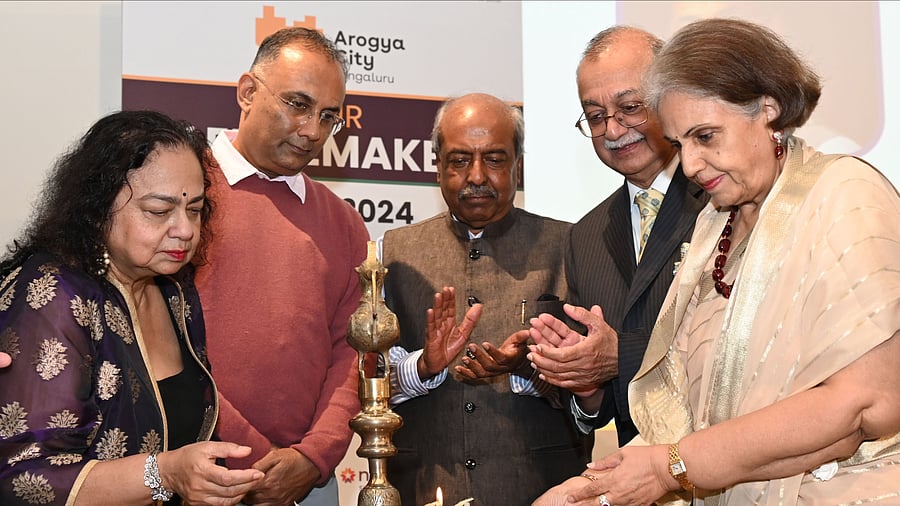
Pramoda Devi Wadiyar, the matriarch of Mysuru’s royal family, inaugurated the Arogya City Summit 2024 in Bengaluru on Tuesday. Health Minister Dinesh Gundu Rao; Dr H Sudarshan Ballal, Chairman of Manipal Hospitals; Dr Nalini Saligram, Founder & CEO of Arogya World; and K Jairaj, Chairman of Arogya City, are seen
Credit: DH photo
Bengaluru: The state government’s Gruha Arogya programme, a door-to-door health screening initiative, could be integrated into Bengaluru’s Arogya City model to address non-communicable diseases (NCDs) across the city, said Health Minister Dinesh Gundu Rao on Tuesday.
Speaking at the second Arogya City Summit 2024, Rao emphasised the government’s commitment to establishing Bengaluru as India’s first Arogya City. He praised the efforts of 22 pledge-makers from the 2022–24 cycle, who reached out to one million people with health interventions, educational materials, and preventive screenings over the past two years.
Nalini Saligram, founder and CEO of US-based non-profit Arogya World, highlighted the alarming statistics of diabetes in India, with 212 million diabetic patients and 150 million prediabetic individuals. Bengaluru mirrors this trend, with over 75% of adults either diabetic or prediabetic and cardiovascular diseases accounting for one in four deaths.
"We aim to foster a preventive attitude across Bengaluru. While diabetes is a significant challenge, it is preventable, not inevitable,” Nalini said, urging residents to inspire healthy lifestyle changes within their communities.
Health vision
Rao reiterated the government’s focus on enhancing preventive health initiatives for NCDs. “Achieving success requires an enlightened citizenry united for societal well-being. Our department, along with the BBMP, can collaborate with Arogya World to reach the city’s entire population, creating a replicable model for the rest of the country,” he said.
Pramoda Devi Wadiyar, the matriarch of Mysuru’s royal family, supported expanding the Arogya City model to Mysuru.
Dr H Sudarshan Ballal, Chairman of Manipal Hospitals, advocated lifestyle changes to prevent NCDs, including reducing sugar, salt, alcohol, smoking, and sedentary habits while improving sleep and social skills. “Hospitals should ideally be reserved for emergencies,” he added.
B'luru health commissioner
BBMP Chief Commissioner Tushar Girinath announced plans to propose a dedicated health commissioner for Bengaluru. “This role would oversee urban health, addressing PHCs for the BBMP and secondary and tertiary care for the state. The commissioner would also serve on the boards of all medical colleges, ensuring a nuanced approach to Bengaluru’s urban health challenges,” Girinath explained.
The summit highlighted the importance of collaborative efforts in addressing NCDs and advancing Bengaluru’s journey toward becoming a model Arogya City.
